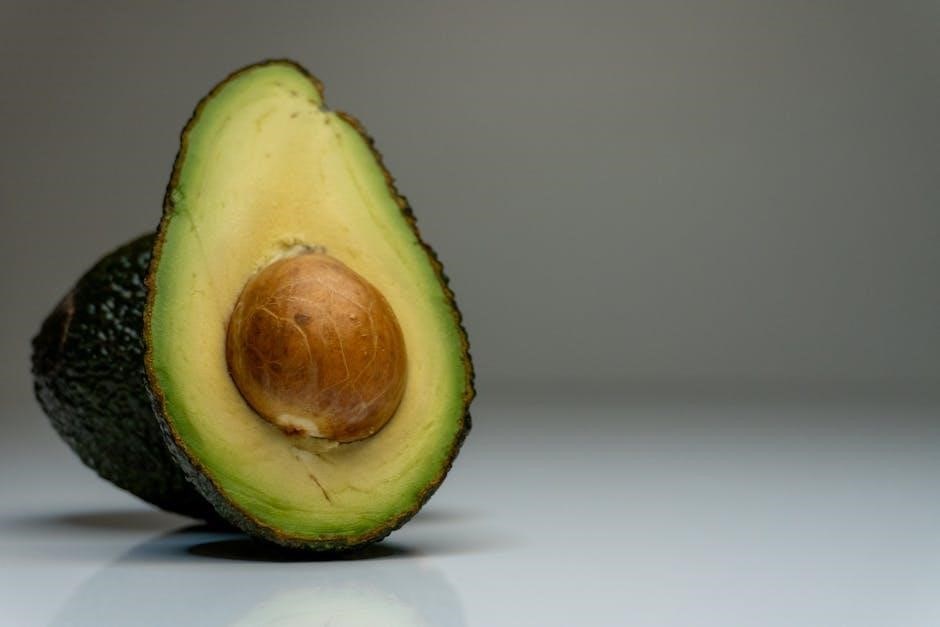A low-fat diet focuses on reducing dietary fat intake, emphasizing whole, nutrient-rich foods like fruits, vegetables, and lean proteins․ It aims to promote health and weight management by limiting high-fat, high-calorie foods and fried items․ Ideal for managing conditions like fatty liver disease, this approach encourages mindful eating and balanced nutrition․
Understanding the Importance of Low-Fat Foods
Low-fat foods play a crucial role in maintaining health by reducing the risk of chronic diseases like heart disease and obesity․ They help manage calorie intake and support weight control․ Incorporating low-fat options ensures a balanced diet rich in essential nutrients while minimizing saturated and trans fats․ These foods are particularly beneficial for individuals with health conditions requiring dietary fat restriction․ Understanding their importance aids in making informed choices for a healthier lifestyle;

What Are Low-Fat Foods?
Low-fat foods are products containing minimal fat content, typically less than 3 grams per serving․ They include lean meats, fish, dairy alternatives, fruits, and vegetables;
Definition and Classification of Low-Fat Foods
Low-fat foods are defined as products with minimal fat content, typically below 3 grams per serving․ They are classified into categories like lean proteins, dairy, fruits, and vegetables․ These foods are often rich in nutrients but low in calories, making them ideal for health-conscious diets․ Classification helps in identifying suitable options for various dietary needs, ensuring balanced nutrition while reducing fat intake․ This categorization aids in meal planning and grocery shopping, promoting healthier eating habits effectively․

Benefits of a Low-Fat Diet
A low-fat diet supports weight management, reduces heart disease risk, and helps manage conditions like fatty liver disease by promoting balanced nutrition and healthier eating habits․
Health Advantages of Incorporating Low-Fat Foods
Incorporating low-fat foods into your diet offers numerous health benefits, including improved weight management and reduced risks of heart disease․ Low-fat diets help lower cholesterol levels and blood pressure, contributing to a healthier cardiovascular system․ They also aid in managing conditions like fatty liver disease and type 2 diabetes by stabilizing blood sugar levels․ Additionally, low-fat foods often promote satiety, making it easier to maintain a balanced calorie intake and support overall well-being․ This dietary approach is both sustainable and beneficial for long-term health goals․

Low-Fat Food List
A low-fat food list includes lean proteins, whole grains, fruits, vegetables, and low-fat dairy products․ These options help reduce calorie intake while providing essential nutrients․
Dairy Products and Milk Alternatives
Dairy products like skim milk, nonfat yogurt, and low-fat cheese are excellent low-fat options․ Milk alternatives such as almond, soy, and oat milk are also great choices․ These products provide essential nutrients like calcium and protein without excessive fat․ Opting for fat-free or reduced-fat versions helps maintain a balanced diet․ Always check nutrition labels to ensure they align with your low-fat goals․ Incorporating these into meals supports overall health and weight management․
Lean Proteins and Meat Options
Lean proteins are crucial for a healthy, low-fat diet․ Choose poultry like chicken and turkey without skin, and opt for fish rich in omega-3s, such as salmon and cod․ Plant-based proteins like beans, lentils, and tofu are excellent alternatives․ When selecting meats, go for cuts labeled as lean or extra-lean․ Avoid processed meats high in saturated fats․ Incorporating these proteins ensures you get essential nutrients while keeping fat intake low, supporting overall well-being and weight management effectively․
Vegetables and Fruits
Fresh vegetables and fruits are cornerstone components of a low-fat diet․ They are naturally low in fat and rich in essential vitamins, minerals, and antioxidants․ Incorporate a variety of colorful options like leafy greens, berries, and citrus fruits․ These foods not only provide vital nutrients but also aid in satiety, making them ideal for weight management․ Avoid high-fat preparations like frying or adding heavy sauces․ Fresh, raw, or steamed vegetables and fruits are the best choices for a healthy, balanced diet․
Whole Grains and Bread Products
Whole grains and bread products are excellent choices for a low-fat diet․ They provide essential nutrients like fiber, vitamins, and minerals, supporting heart health and digestion․ Opt for whole wheat bread, oats, quinoa, brown rice, and whole grain cereals․ These foods enhance nutrition and satisfaction without adding unnecessary fats․ When shopping, choose products labeled as ‘100% whole grain’ to ensure they meet low-fat criteria and avoid refined grains that may contain hidden fats․
Incorporating Low-Fat Foods into Your Diet
Start by substituting high-fat ingredients with low-fat alternatives in recipes․ Plan meals around whole grains, lean proteins, and plenty of fruits and vegetables․ Gradually adjust portion sizes to maintain balance and flavor while reducing fat intake․ Use herbs and spices for seasoning instead of oils or butter to keep dishes tasty and healthy․ Over time, these small changes can lead to a sustainable, low-fat dietary habit․
Practical Tips for Meal Planning
Plan meals weekly, incorporating items from your low-fat food list․ Substitute high-fat ingredients with alternatives like lean proteins and fat-free dairy․ Use herbs and spices for flavor instead of oils or butter․ Balance each meal with portions of whole grains, vegetables, and fruits․ Avoid fried foods and opt for baking, grilling, or steaming․ Keep snacks simple with fruits or nonfat yogurt․ Ensure variety to maintain interest and nutrition․ Consult your low-fat food list PDF for inspiration and guidance on making healthy choices․
Reading Food Labels
Examine nutrition facts for total fat, saturated fat, and added sugars․ Choose items with minimal fat content and avoid products with hidden fats, opting for whole foods․
How to Identify Low-Fat Options
To identify low-fat options, check food labels for “low-fat” or “fat-free” designations․ Look for products with less than 3g of fat per serving․ Opt for items labeled “reduced fat” or “light,” which contain at least 25% less fat than the original version․ Always review the Nutrition Facts panel to verify total and saturated fat content․ Avoid products with hidden fats, such as added oils or butter․ Prioritize whole, unprocessed foods like fruits, vegetables, and lean proteins, which naturally tend to be lower in fat․ Be cautious of sugary substitutes in low-fat items․


Common Mistakes to Avoid
Avoid overconsumption of sugary substitutes in low-fat foods and neglecting portion control․ Don’t assume all low-fat options are healthy, as some may contain added sugars or sodium․ Skipping meals and extreme calorie restriction can hinder progress․ Overeating “healthy” fats, like nuts, can still lead to weight gain․ Misinterpreting food labels is another pitfall—ensure to check both total and saturated fat content carefully․ Relying solely on processed low-fat products without including whole foods can unbalance your diet․ Be mindful of hidden fats in seemingly low-fat items․ Ignoring the overall nutritional value can lead to nutrient deficiencies․ Avoiding fats entirely, as some are essential for health․ Not consulting a dietitian or healthcare provider for personalized advice can lead to ineffective diet plans․ Overlooking the importance of fiber and protein in satiety and metabolism regulation․ Failing to plan meals can result in unhealthy choices and poor adherence to the diet․ Don’t forget to stay hydrated, as hydration impacts metabolism and overall health․ Neglecting physical activity can reduce the effectiveness of a low-fat diet․ Avoiding social support and accountability can make maintaining the diet challenging․ Not regularly reviewing and updating your diet plan can prevent necessary adjustments for continued success․ Overlooking potential allergies or intolerances in low-fat food choices can lead to discomfort or health issues․ Avoiding regular health check-ups to monitor progress and make informed adjustments․ Not being patient and expecting immediate results can lead to discouragement․ Overlooking the importance of sleep quality in metabolism and weight management․ Failing to address emotional eating can undermine dietary efforts․ Avoiding stress management techniques can increase cravings for unhealthy foods․ Not incorporating variety in your diet can lead to boredom and dissatisfaction․ Overlooking the role of probiotics and gut health in digestion and nutrient absorption․ Avoiding regular physical activity can slow metabolism and hinder weight loss․ Not staying informed about new research and updates on low-fat diets can lead to outdated practices․ Overlooking potential interactions with medications when making dietary changes․ Avoiding proper food storage and preparation can lead to spoilage and foodborne illness․ Not budgeting for healthy, low-fat options can make maintaining the diet difficult․ Overlooking the importance of meal prepping and planning can lead to last-minute unhealthy choices․ Avoiding the use of healthy cooking methods can result in adding unnecessary fats․ Not incorporating enough omega-3 fatty acids, which are essential for heart health․ Overlooking the benefits of certain fats, like avocados and nuts, in moderation․ Avoiding regular tracking of food intake can make it hard to assess progress․ Not celebrating small victories can lead to a lack of motivation․ Overlooking the importance of a support system in maintaining dietary changes․ Avoiding regular weigh-ins and progress monitoring can lead to complacency; Not being flexible with the diet can result in burnout․ Overlooking the impact of hormones on metabolism and weight․ Avoiding necessary supplements, like vitamin D, that support overall health․ Not addressing underlying health conditions that may affect weight loss․ Overlooking the role of probiotics in gut health and digestion․ Avoiding regular detoxification of the body through healthy eating․ Not incorporating enough fermented foods for gut health․ Overlooking the benefits of certain teas, like green tea, in boosting metabolism․ Avoiding regular consumption of fiber-rich foods for digestive health․ Not addressing potential food intolerances that may hinder progress․ Overlooking the importance of regular blood work to monitor health markers․ Avoiding open communication with healthcare providers about dietary concerns․ Not staying consistent with the diet can lead to fluctuating results․ Overlooking the impact of travel and dining out on dietary adherence․ Avoiding the use of technology, like apps, to track progress․ Not regularly updating your diet plan based on changing needs and preferences․ Overlooking the importance of mental health in overall well-being․ Avoiding regular relaxation and stress-reduction practices․ Not addressing potential eating disorders that may arise․ Overlooking the role of mindful eating in portion control and satisfaction․ Avoiding the use of positive affirmations to maintain motivation․ Not regularly rewarding yourself for milestones achieved․ Overlooking the impact of environmental factors on eating habits․ Avoiding regular cleaning and organization of your kitchen to promote healthy cooking․ Not addressing potential triggers for unhealthy eating․ Overlooking the importance of regular dental care for overall health․ Avoiding regular check-ups with a nutritionist to refine your diet․ Not staying educated on the latest nutrition research and trends․ Overlooking the benefits of certain spices and herbs in enhancing flavor without added fats․ Avoiding regular use of a food diary to track eating habits․ Not addressing potential allergies to certain low-fat foods․ Overlooking the role of sleep in hunger regulation and metabolism․ Avoiding regular stretching and mobility exercises for overall health․ Not addressing potential issues with absorption of nutrients․ Overlooking the importance of regular exercise in maintaining muscle mass․ Avoiding regular consumption of antioxidant-rich foods for overall health․ Not addressing potential deficiencies in essential vitamins and minerals․ Overlooking the role of hydration in digestion and metabolism․ Avoiding regular monitoring of blood sugar levels, especially for diabetics․ Not addressing potential interactions between medications and diet․ Overlooking the importance of regular eye exams for early detection of health issues․ Avoiding regular consumption of omega-3 rich foods for heart health․ Not addressing potential issues with bone density․ Overlooking the role of calcium and vitamin D in bone health․ Avoiding regular strength training exercises for muscle maintenance․ Not addressing potential issues with thyroid function․ Overlooking the importance of regular skin care for overall health․ Avoiding regular consumption of foods rich in vitamin C for immune health․ Not addressing potential issues with iron levels․ Overlooking the role of fiber in digestive health․ Avoiding regular consumption of whole grains for sustained energy․ Not addressing potential issues with gut health․ Overlooking the importance of regular consumption of fermented foods․ Avoiding regular use of probiotics for gut health․ Not addressing potential issues with candida overgrowth․ Overlooking the importance of regular consumption of leafy greens for iron․ Avoiding regular monitoring of cholesterol levels․ Not addressing potential issues with lipid profiles․ Overlooking the role of regular blood donations for iron levels․ Avoiding regular consumption of foods rich in vitamin B12 for energy․ Not addressing potential issues with anemia․ Overlooking the importance of regular consumption of lean proteins for muscle repair․ Avoiding regular monitoring of kidney function․ Not addressing potential issues with protein intake․ Overlooking the role of regular consumption of healthy fats for brain health․ Avoiding regular use of flaxseeds for omega-3s․ Not addressing potential issues with menopause symptoms․ Overlooking the importance of regular consumption of soy products for hormone balance․ Avoiding regular monitoring of hormone levels․ Not addressing potential issues with polycystic ovary syndrome (PCOS)․ Overlooking the role of regular consumption of whole grains for insulin sensitivity․ Avoiding regular monitoring of blood sugar levels․ Not addressing potential issues with insulin resistance․ Overlooking the importance of regular consumption of foods rich in antioxidants․ Avoiding regular use of turmeric for inflammation․ Not addressing potential issues with chronic inflammation․ Overlooking the role of regular consumption of ginger for digestion․ Avoiding regular monitoring of digestive health․ Not addressing potential issues with irritable bowel syndrome (IBS)․ Overlooking the importance of regular consumption of probiotic-rich foods․ Avoiding regular use of kombucha for gut health․ Not addressing potential issues with leaky gut syndrome․ Overlooking the role of regular consumption of bone broth for collagen․ Avoiding regular monitoring of skin health․ Not addressing potential issues with acne or eczema․ Overlooking the importance of regular consumption of foods rich in vitamin A․ Avoiding regular use of retinol products for skin health․ Not addressing potential issues with psoriasis․ Overlooking the role of regular consumption of fatty fish for omega-3s․ Avoiding regular monitoring of heart health; Not addressing potential issues with high blood pressure․ Overlooking the importance of regular consumption of potassium-rich foods․ Avoiding regular use of bananas for potassium․ Not addressing potential issues with muscle cramps․ Overlooking the role of regular consumption of foods rich in magnesium․ Avoiding regular monitoring of muscle function․ Not addressing potential issues with fibromyalgia․ Overlooking the importance of regular consumption of dark chocolate for antioxidants․ Avoiding regular use of cocoa powder in recipes․ Not addressing potential issues with mood swings․ Overlooking the role of regular consumption of foods rich in tryptophan for serotonin․ Avoiding regular monitoring of mental health․ Not addressing potential issues with depression or anxiety․ Overlooking the importance of regular consumption of complex carbohydrates for mood stabilization․ Avoiding regular use of whole grain bread for serotonin production․ Not addressing potential issues with seasonal affective disorder (SAD)․ Overlooking the role of regular consumption of foods rich in vitamin D․ Avoiding regular monitoring of mood during winter months․ Not addressing potential issues with light therapy needs․ Overlooking the importance of regular consumption of omega-3 rich foods for brain health․ Avoiding regular use of fish oil supplements․ Not addressing potential issues with attention deficit hyperactivity disorder (ADHD)․ Overlooking the role of regular consumption of foods rich in zinc for focus․ Avoiding regular monitoring of cognitive function․ Not addressing potential issues with memory loss․ Overlooking the importance of regular consumption of foods rich in antioxidants for brain protection․ Avoiding regular use of blueberries for cognitive health․ Not addressing potential issues with Alzheimer’s disease․ Overlooking the role of regular consumption of foods rich in vitamin E for brain protection․ Avoiding regular monitoring of cognitive decline․ Not addressing potential issues with dementia․ Overlooking the importance of regular consumption of foods rich in lycopene for prostate health․ Avoiding regular use of tomatoes for lycopene․ Not addressing potential issues with benign prostatic hyperplasia (BPH)․ Overlooking the role of regular consumption of foods rich in selenium for prostate health․ Avoiding regular monitoring of prostate function․ Not addressing potential issues with prostate cancer․ Overlooking the importance of regular consumption of foods rich in cruciferous vegetables for cancer prevention․ Avoiding regular use of broccoli for
Low-Fat Food List PDF Resources
Pitfalls of a Low-Fat Diet
A low-fat diet may inadvertently lead to overconsumption of sugars and refined carbs, as many low-fat products are high in added sugars․ Relying solely on processed low-fat foods can result in nutrient imbalances and increased sodium intake․ Neglecting healthy fats, like avocados and nuts, can deprive the body of essential fatty acids and fiber․ Over-restricting fats may lead to feelings of deprivation, potentially causing binge eating or dissatisfaction․ Additionally, some low-fat diets may lack sufficient protein, leading to muscle loss and decreased satiety․ Misreading food labels can also result in unintended high-fat intake․ Avoiding fats entirely can negatively impact hormone production and overall health․ Ensuring a balanced approach is crucial for long-term success․
